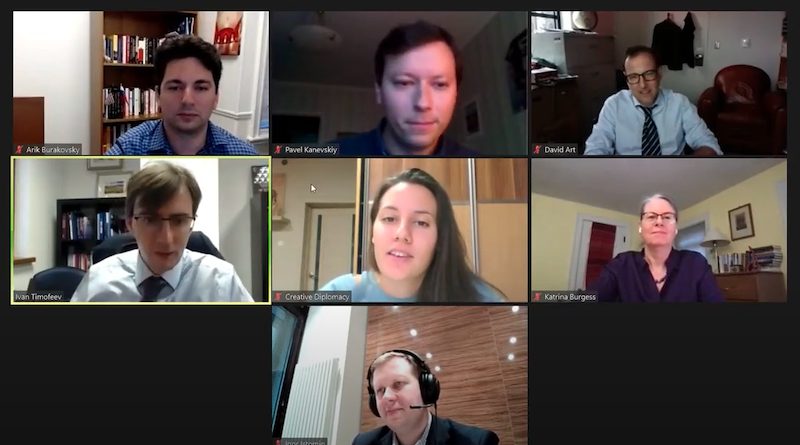Kortunov Global Affairs Debates: The Connection Between the Rise of Populism and Economic Inequality
By Alex Avaneszadeh, MALD 2023 Candidate, The Fletcher School
On September 28, 2021, the Russia and Eurasia Program hosted the second round of the Kortunov Global Affairs Debates, “Economic Inequality and The Rise of Populism Worldwide.” The debate was co-organized by the Russian International Affairs Council and the Center for the Support and Development of Public Initiatives Creative Diplomacy. The annual debates are held in memory of Dr. Sergei V. Kortunov, a Russian political scientist and the author of many publications on national security and identity.
At the beginning of the event, the audience participated in a poll asking whether they believed that the rise of global populism was due to growing economic inequality. The results indicated that most audience members did not believe there was a connection between the two.
Speakers Katrina Burgess, associate professor of political economy at The Fletcher School and director of the Henry J. Leir Institute, and Igor Istomin, associate professor of applied international political analysis at MGIMO University, both took the position that structural conditions generated by economic inequality do in fact create the conditions for populist movements. On the other side, speakers Pavel Kanevskiy, associate professor of political science at Moscow State University, and David Art, professor of political science at Tufts University, argued that populism is driven by cultural and identity politics rather than economic inequality.
Professor Burgess opened by stating that populism has three defining features, which include “anti-elite discourse, personalist leadership often by political outsiders, and multi-class support coalitions.” All three are fueled by economic inequalities, in which the “have-nots” become resentful of being denied opportunities for growth and the “haves” use their power to lock the class disparity in place for their advantage. As such, Burgess argued that economic discontent activates identity politics, which then blames demographic shifts prompted by immigration, for example.
Professor Istomin echoed Professor Burgess’ argument, adding that populism “pushes out institutional mechanisms,” as the movement consolidates power by exploiting the unfairness of economic inequality. He stated that although drivers of populism are different in different countries, corruption frequently indicates economic inequality and unfairness.
Professor Kanevskiy countered that the negative connotation of the term ‘populism’ is a relatively new phenomenon, and cited examples of the human rights movements of the 1960s being considered “populist.” He argued that economic inequality is not a central factor, but that populism develops in both a “top-down” and “bottom-up” approach. A top-down populist movement accompanies authoritarian rule and exploits public fear, while a bottom-up movement may be rational and facilitate participatory public engagement in democratic processes.
Professor Art built on his point, stating, “What people think are major populist movements like in industrial societies is not necessarily populism, but rather competitive authoritarianism.”
He continued, “One does not need to look much further than culture. Economics tells very little about what is needed to understand populism.” Citing the January 6 insurrection in the United States, he noted that the pro-Donald Trump demonstrators did not indicate that economics was a factor in the movement. Rather, their protest signs referenced cultural issues like anti-immigration or “building the wall.”
Each speaker had the opportunity to respond to the others’ opening statements, beginning with Professor Burgess. She stated that people use different definitions of populism to make their arguments, and believes that her defining features of populism are relevant across historical periods and the left-right political spectrum.
She reiterated, “The systemic structural conditions generated by economic inequality are what provide the necessary conditions for populists.”
Kanevskiy agreed with Burgess that structural inequality is important, but that people attribute their needs not being met to status.
Professor Art stated that measurements of populism have not effectively linked those measurements to specific causes. As such, he ended by posing the question of whether populism even exists.
The debate concluded with audience members taking the same poll again. The result was that a greater number supported the initial consensus that economic inequality does not contribute to the rise in global populism.

